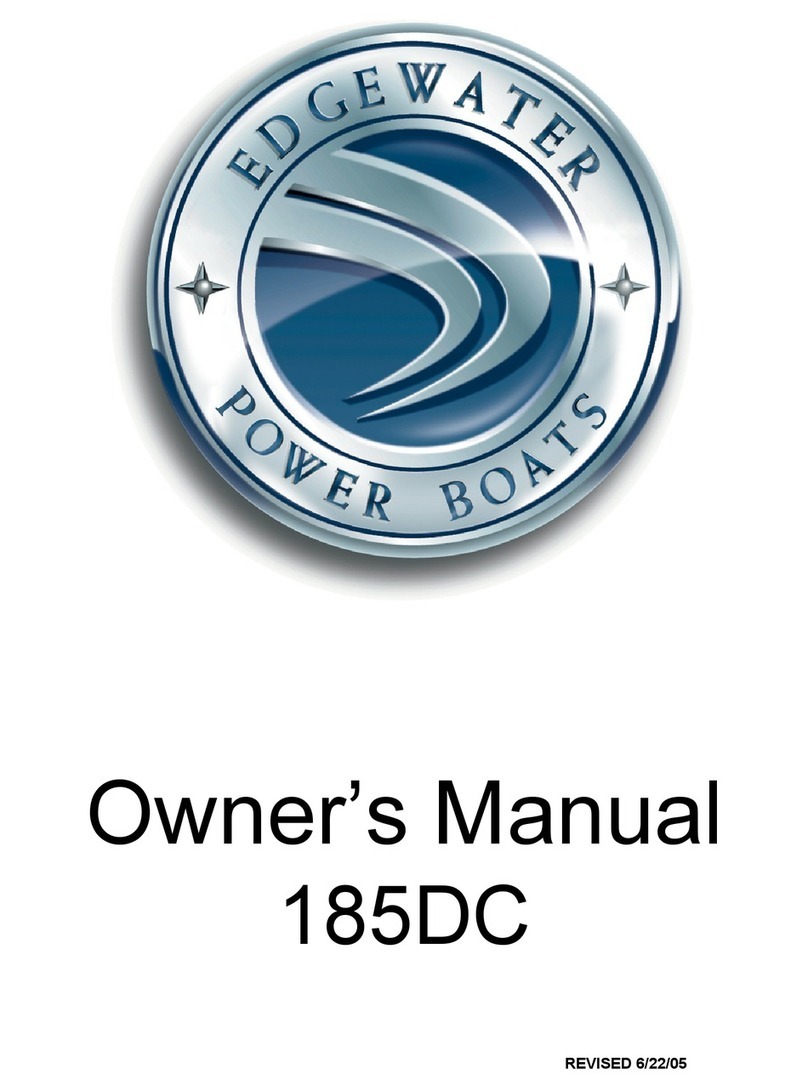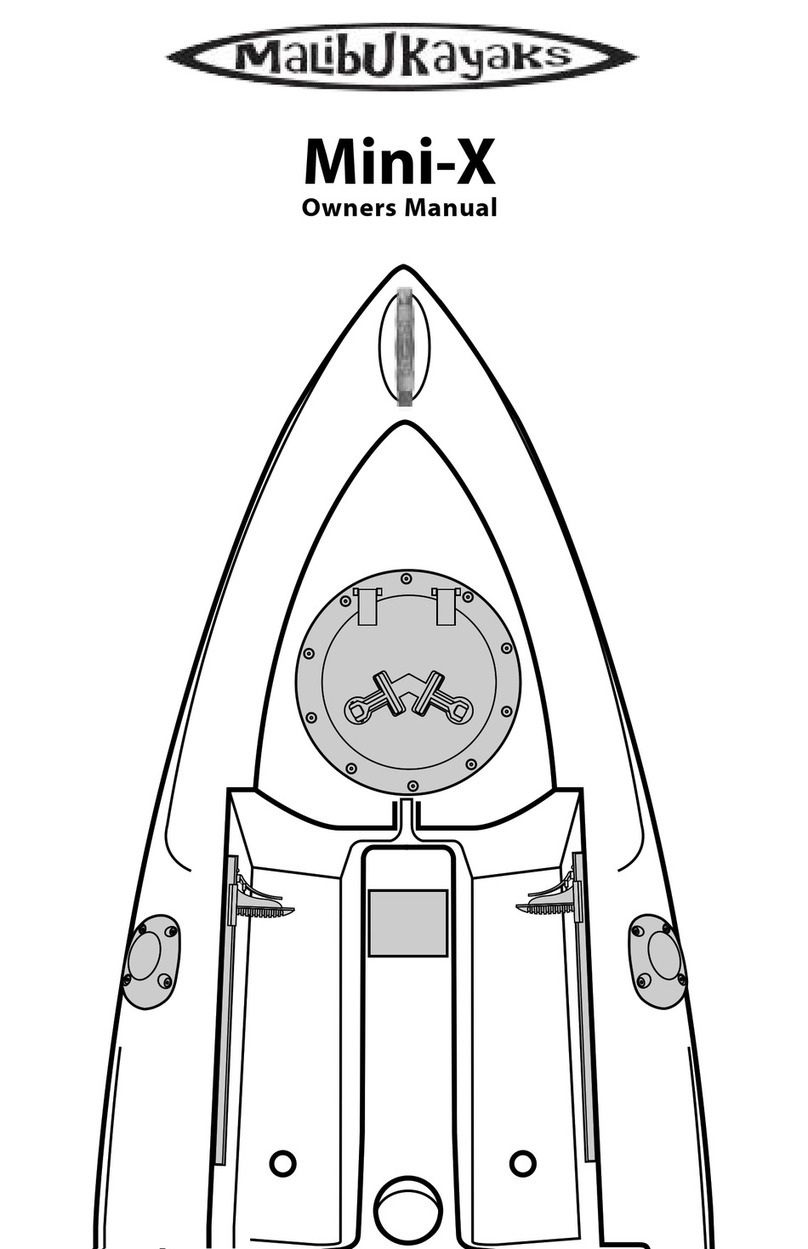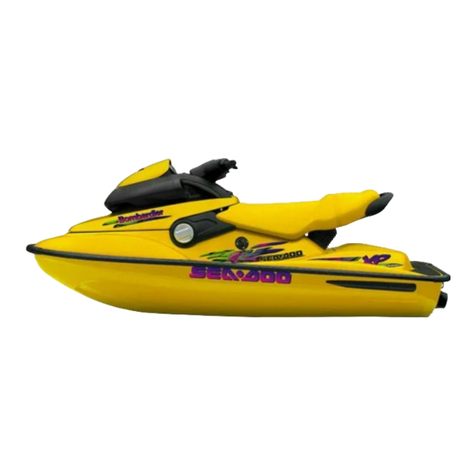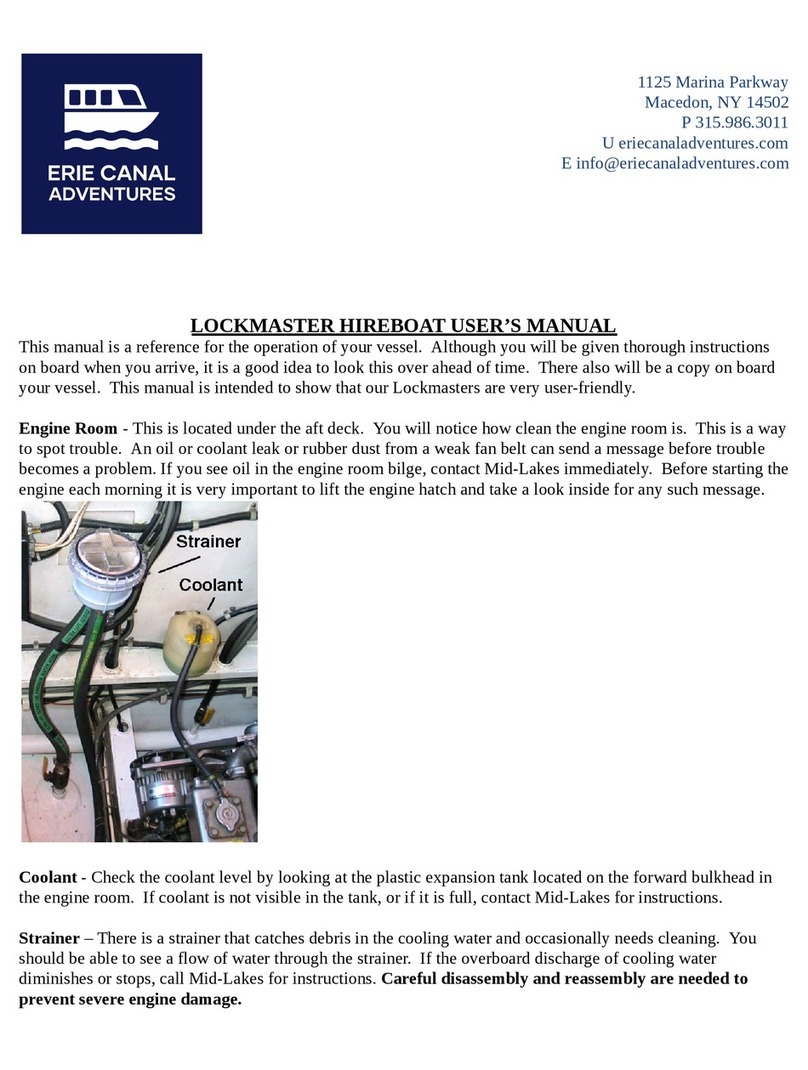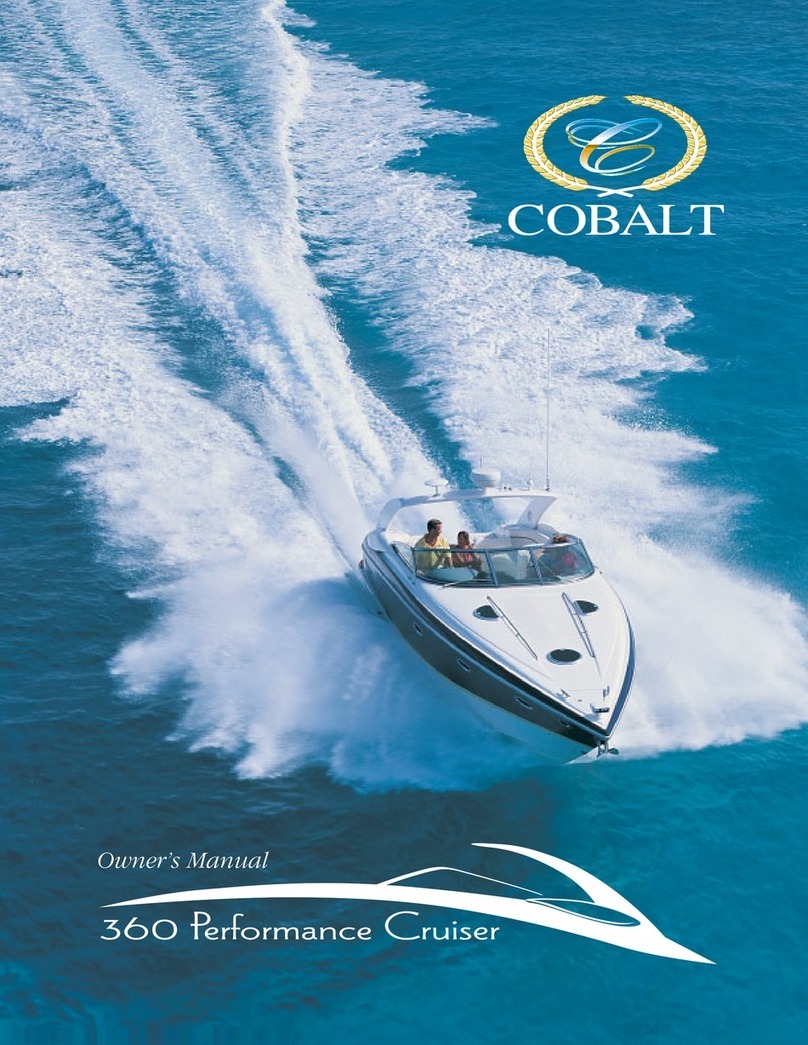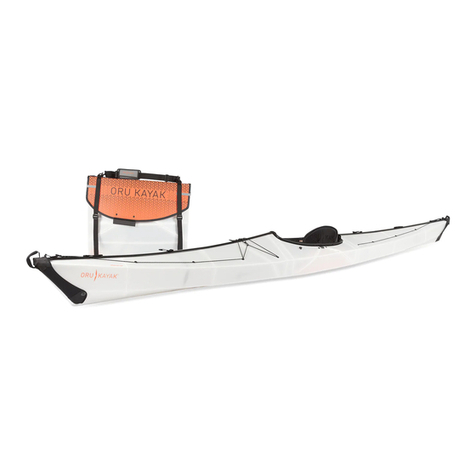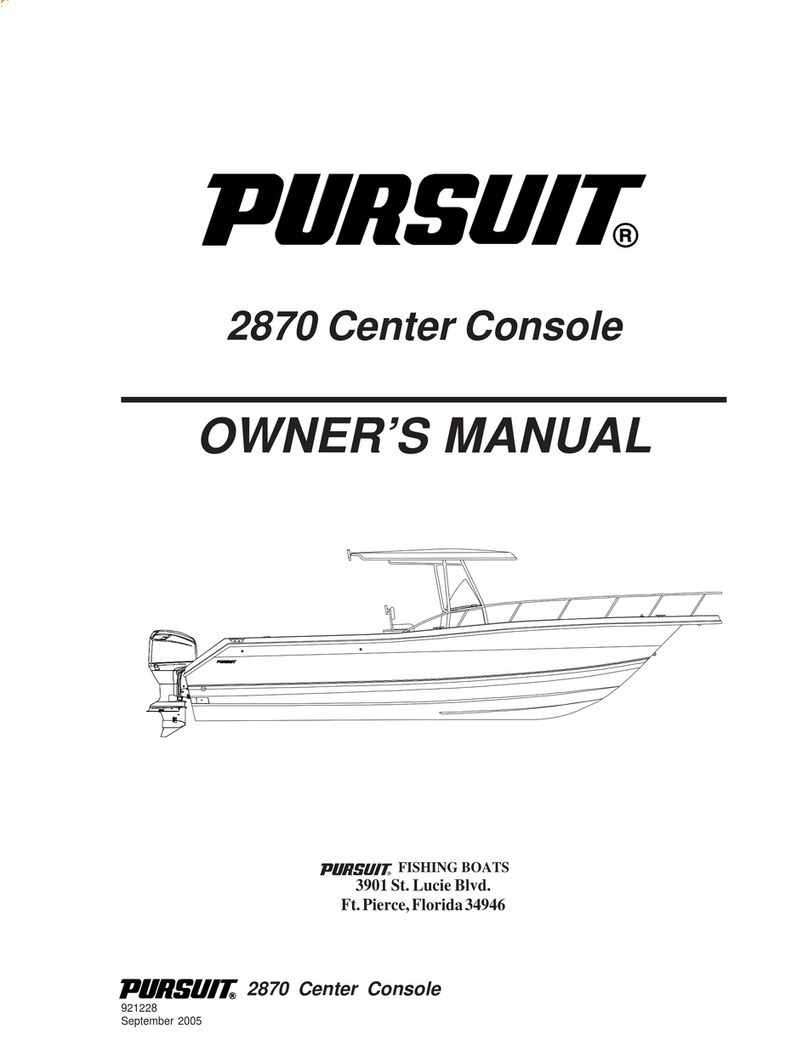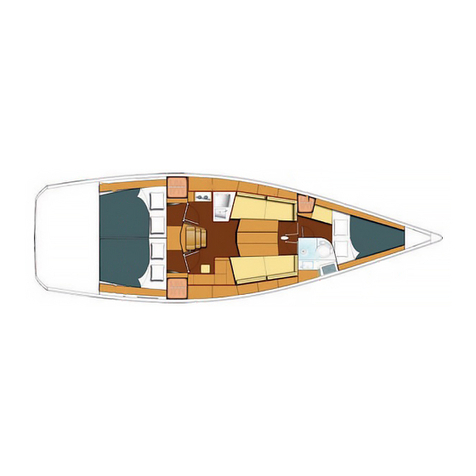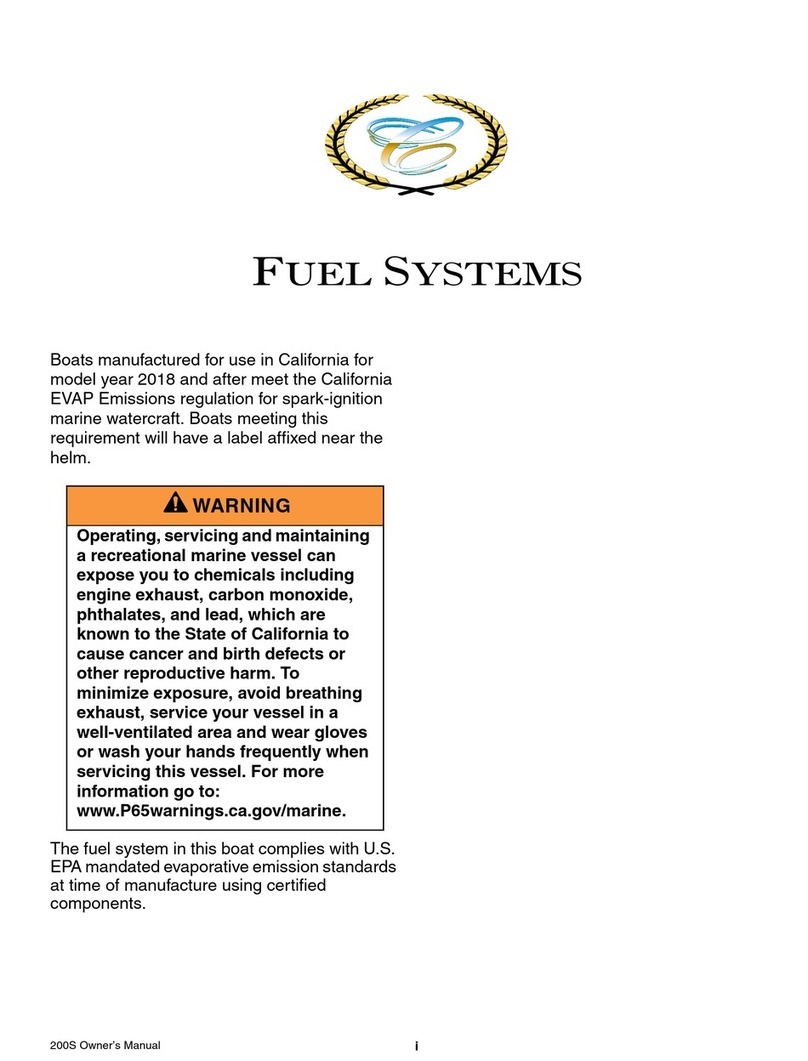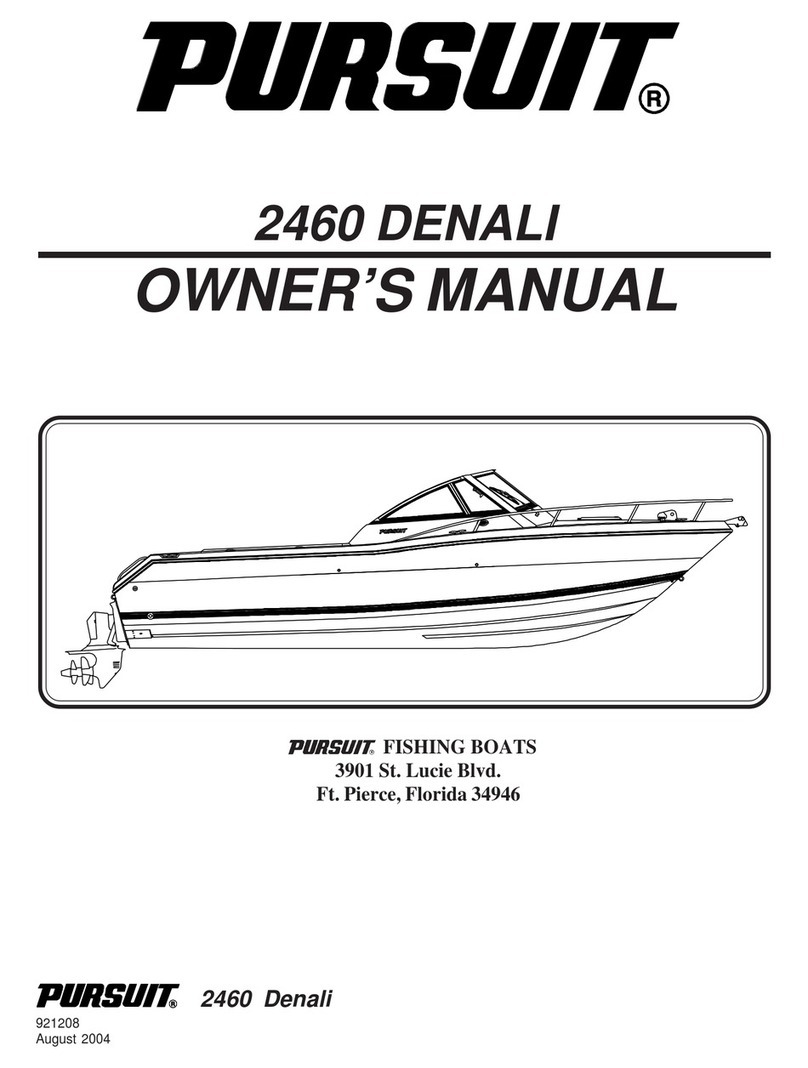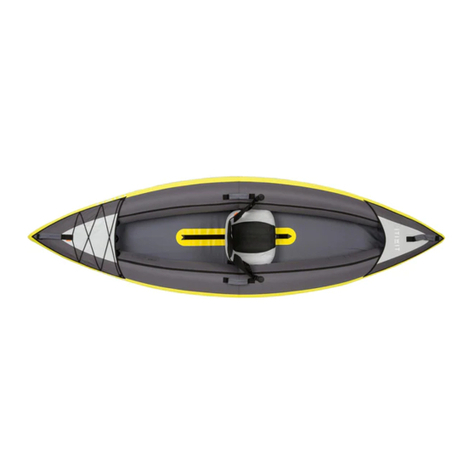Bavaria Yachts SE30 User manual

OWNER'S MANUAL
BAVARIA C45
OWNER'S MANUAL
BAVARIA C38

2
Owner's manual
Contents
1. Introduction 4
2. Responsibility of the skipper 5
2.1. Servicing intervals 6
3. About this manual 7
3.1. Manuals for products bought-in and integrated 7
3.2. Signs 8
3.3. Explanation of the hazard instructions 9
4. Design category and certification 10
4.1. Certification 10
4.2. Marking of the boat & CE certification of the design category 10
4.3. Explanations on the WIN and the builder's plate 11
4.4. Certification - DNV-GL certificate 12
5. Data on the boat 14
5.1. Primary dimensions 14
5.2. Sail dimensions 14
5.3. Interior of the boat 18
5.4. Permanently installed tanks 23
5.5. Deck plan 24
6. Systems 26
6.1. Bilge pumps 26
6.2. Lighting 29
6.3. Electrical system on board 32
6.4. General 32
6.5. DC system 36
6.6. Work on the batteries 39
6.7. AC system 40
6.8. Fuel system 46
6.9. Gas system 48
6.10. Thruster 53
6.11. Toilets and waste water 59
6.12. Steering system 59
6.13. Emergency steering system 61
6.14. Anchor windlass/capstan 62
6.15. Fresh water system 63

3
Contents
7. Navigation and handling 66
7.1. Operation of the engine 66
7.2. Engine and its peripherals 67
7.3. Propeller 68
7.4. View from the controls 68
7.5. Handling characteristics 69
7.6. Navigation lights 72
7.7. Anchoring, mooring and towing - safety instructions 72
7.8. Preventing collisions 73
7.9. Dangers of carbon monoxide 73
7.10. Ventilation of the cabins 74
7.11. Refuelling 75
8. Basic considerations 76
8.1. Recommended safety equipment 76
8.2. Basic equipment 76
8.3. Measures in bad weather 76
8.4. Securing loose equipment 77
8.5. Stability - risk of the loss of stability 77
8.6. Man overboard - risk of falling overboard 78
8.7. Reboarding aids 79
8.8. Waterlogging/sinking - risk of flooding 81
8.9. Fire hazard/fire protection 82
8.10. Escape routes 84
8.11. Smoke detector 84
8.12. Life raft 88
8.13. Hull fittings 89
8.14. Grounding 92
8.15. The rigging 93
8.16. Transport, cranes, slipways and storage 94
9. Servicing/care/working on the boat 96
9.1. Servicing 96
10. Protection of the environment 100
11. Closing remarks and notes 102
12. Identification certificate 103
13. Confirmation of receipt 104
14. Space for your notes 105

4
Owner's manual
1. Introduction
For your own safety, please make sure you have received all the information and documents about the boat's
systems from the previous owner. Please keep this Owner's Manual in a safe place and hand it over to the new
owner if you sell the craft. It is recommended to keep the manual in a water-proof cover on board.
This manual is intended to help you enjoy your BAVARIA C38 and sail it safely. Along with information about the
yacht itself, information about the accessories supplied and the yacht's systems, the manual also contains
information about operation and servicing. It is imperative precautions are taken before the appliances are
switched on, particularly for appliances that rely on a supply of sea water for cooling (cooling water for the air
conditioning unit, etc.). Before a voyage, please familiarise yourself with this manual and the manuals pro-
vided for the components; also make sure everyone who sails this vessel reads these documents.
If this is your first sailing yacht or if you are not familiar with the special characteristics of such a comfortable,
sporting sailing yacht, for your safety and comfort make sure you familiarise yourself with how to handle and
operate the boat before a voyage. The yard or your dealer will also be pleased to inform you about training
courses if you would like to expand or refresh your knowledge in this manner.
Irrespective of the seaworthiness of the vessel and its design category, protection against high seas and
strong winds cannot be guaranteed. Always pay attention to the wind and the current. Before a trip, always
take into consideration the ability, stamina and above all the qualifications of your crew.
Because the scope of delivery varies depending on the order, the equipment on your yacht may vary from some
of the descriptions and illustrations. To be able to adapt our yachts to the continually advancing state-of-the-
art, we must reserve the right to make changes to the form, equipment and technology. For these reasons, no
claims can be derived from any of the data, illustrations or descriptions in this manual.
BAVARIA YACHTBAU GmbH would like to welcome you warmly to the world of BAVARIA yacht owners and thank
you for the confidence you have placed in our products by acquiring this yacht.
Your dealer along with the management and employees at BAVARIA YACHTBAU GmbH wish you much pleasure
with your new sailing yacht.
We wish you a safe voyage at all times; may there always be enough water beneath your keel
BAVARIA YACHTBAU GmbH
The Management
Michael Müller (CEO)

5
Responsibility of the skipper
2. Responsibility of the skipper
The owner/skipper is fully responsible and must comply with the following basic rules:
1. Know the limitations of your boat!
2. Follow the German regulations on maritime waterways (Seeschifffahrtsstraßen-Ordnung, SeeSchStrO) or
the rules that apply to the maritime area you chose to frequent.
3. Keep a careful lookout for people, animals and objects in the water.
4. Make sure the expected wind and sea conditions always correspond to the category of your boat and your
crew can handle the boat in these conditions.
5. At all times pay attention to the safety of your crew and the passengers.
6. Never sail under the effects of alcohol and/or drugs or medication.
7. Make sure the crew receives suitable training, particularly in relation to the location and usage of safety
equipment (life vests, life rafts, distress signals, etc.).
8. Reduce your speed in bad visibility, rough seas, if there are people in the water, or there are boats or float-
ing structures nearby.
9. Do not overestimate your own abilities! It is sensible and advisable to seek advice and obtain specific
information from the authorities, related departments or experienced skippers in good time.
10. Practice important manoeuvres with your guests and crew members, above all the man overboard
manoeuvre. Every person on board should be able to execute these manoeuvres on their own – the expe-
rienced skipper could also fall overboard and need rescuing.
11. Have your vessel inspected by qualified personnel at regular intervals and have it serviced and repaired
properly if faults occur.
12. Follow the regulations in the area you are sailing. This statement also applies to the regulations on carry-
ing safety equipment, having an appropriate skipper's licence and respecting the rules on the protection
of the environment.
13. The water level in the bilge should be checked at regular intervals. Bilge water or other liquids will reduce
the stability and therefore your safety.
14. Irrespective of the seaworthiness of the boat and its design category, protection against high seas, strong
winds and currents as well as the related phenomena cannot be guaranteed. Always pay attention to the
wind and the current. Before a voyage, always take into account the crew's abilities and qualifications.
15. This boat is only allowed to be sailed by persons who meet the related statutory requirements. In many
countries a licence is now compulsory or there are other statutory arrangements. Therefore, obtain infor-
mation on the local situation before starting a trip.
If you are equipped for an emergency, in most cases it will not occur. If an emergency never-
theless occurs, the yacht should be equipped with the correct equipment for all these situa-
tions. Prepare each trip carefully, even if it is short and apparently insignificant or harmless
because:
weather conditions can change suddenly and accidents are possible on board even without a
swell or adverse weather.

6
Owner's manual
2.1. Servicing intervals
This section contains a general table with typical inspection and maintenance intervals.
System Necessary measures Interval
Each time before use
Follow manufactur-
er's manual
Replace every X years
Every 25 operating
hours
Every 6 months
Annually
Batteries Check poles for corrosion and correct seating
of the terminals
Outlets and
inlets as well as
valves
Check for leaks and correct function 5
Check for corrosion 5
Navigation lights Check for correct function
Bilge area Clean the bilge and the openings
Keel bolts Check and, if necessary,
re-tighten and secure
Check the structure and the load plates
Bilge pumps Check the switch functions correctly
Zinc anodes Check the condition As often as possible
Hull Check for loose or damaged parts
Rudder system Check for correct operation, check rudder for
corrosion
Safety and
rescue
equipment
Check for good condition and completeness,
observe the stipulated servicing intervals,
check inspection sticker
Electrics Check for loose connections
Smoke detector Check smoke detector for correct function 10
Engine Replace filters and wearing parts, check
V-belt, engine in general and propeller/propul-
sion system
Hoses and
connections
Check for leaks and the condition of the
material
5
Rigging, mast,
boom and spars,
standing and
running rigging
Visual inspection of shrouds, stay screw and
rivet joints on the mast/boom
10
12
Condition of sheet ropes and halyards 5-7

7
About this manual
We place the highest requirements on the quality and safety of our products. As part of the routine service
work on yachts we have manufactured, we again refer to the need to inspect the following components and
equipment, and to replace them if necessary. Regular checks and maintenance are important tasks to ensure
your boat has a long service life and to ensure the safety of the crew.
Every point may not apply to your vessel and some sections may not apply because options are not installed
or different options are installed. The frequency of the servicing and maintenance intervals is dependent on
environmental effects and the area in which the vessel is sailed. The intervals given should be considered
upper limits. Failure to comply with regular inspection and replacement intervals for these safety-related
components can involve an increased hazard for life and limb.
Attention
» Changes that affect the safety of the vessel should be assessed before they are imple-
mented and should only be documented by competent persons.
» Any change to the distribution of the weight can significantly affect the stability, the trim
and the handling of the boat.
3. About this manual
This manual has been compiled for your safety and to help you handle your vessel. It contains data and infor-
mation about the systems and equipment fitted. Before a voyage, please familiarise yourself with this manual
and the manuals provided for the components; also make sure everyone who sails this vessel reads these
documents. This manual complies with the regulations for recreational boats and must not be considered a
complete set of operating instructions. A prerequisite for a successful trip is sufficient nautical experience
that will enable you to react correctly in every situation. A manual is no substitute for experience, nautical
training and common sense!
3.1.1.Additional information about your boat
The videos and manuals about the components available at https://www.bavariaplus.de/
de/s/bavis_start for download in various languages are very helpful. Familiarise yourself
with the specific characteristics of your boat and its equipment before your planned trip.
3.1. Manuals for products bought-in and integrated
This manual does not contain any manufacturer information about the systems and equipment supplied by
other manufacturers. You will find detailed information and operating instructions for this equipment in the
original manufacturer manuals. These manuals are included with your documentation if these options were
fitted to your yacht.

8
Owner's manual
3.2. Signs
On the vessel and in the manual there are pictograms with information for the owner/skipper and the crew
about mandatory instructions related to safety and precautions to be taken during the operation and handling
of the vessel. You will find the following symbols on your vessel. They should always be heeded.
Danger (with descriptive text)
The symbol can be in colour or B/W
(see following sections).
Read the manual. The specific
information on the component/
system is explained there.
Electrical hazard
Hazard due to electrical power
D
Fuel filler:
The letter "D" signifies
"Diesel"
Fire hazard - danger Sling position for lifting the boat
safely
Fire extinguisher
can also mark a space where the fire
extinguisher is stowed Öffnung für
Löschmittel
Opening for discharging the fire
extinguisher from the outside
Risk of falling overboard Stowage space for rescue equip-
ment. Life vests or life rafts
Escape route Life raft - stowage space
Warning about equipment that
operates based on electromagnetic
waves in the radio frequency band:
radar
Do not enter/crushing hazard
Escape route that can be reached via
additional step or ladder
Slipping hazard
Corrosive and irritating chemicals Hot components/hazard due to
scalding

9
About this manual
3.3. Explanation of the hazard instructions
In many chapters of this Owner's Manual you will find instructions related to trouble-free operation and ser-
vicing, or that provide a warning about hazards. For improved clarity, these instructions are highlighted in
boxes or warning triangles, in some cases printed in half tones. The pictograms are always supplemented with
a note in the form of text.
Always apply good seamanship! As the skipper, you are responsible for the boat and the
well-being of the crew.
Never remove or cover a safety sign. Replace a damaged or missing sign without delay.
Danger
Signifies that there is an extreme, real source of danger that with high probability will result
in fatality or irreversible injuries or damage, if appropriate precautions and measures are not
taken.
Warning
Signifies that there is a source of danger that may result in injuries or fatality if appropriate
precautions are not taken.
Attention
Represents a reminder about safety precautions or brings to your attention actions that could
be dangerous or result in injuries, or damage to the vessel or its components.
i
Information
Information about useful, important facts or suggestions that contribute to improving safety
while handling the vessel.

10
Owner's manual
4. Design category and certification
This boat bears the CE marking as shown here. This marking states that the requirements of the
EU Recreational Craft Directive 2013/53/EU are met. The design category assigned to the boat
is explained in the following section:
The sailing yacht BAVARIA C38 is in design categories A, B and C
A boat in design category A is designed for extended voyages where conditions may exceed wind force 8
(Beaufort scale) and significant wave heights of 4m and above may occur; these boats must be able to
withstand these conditions largely self-sufficiently. Here extreme conditions, as are caused for instance by
hurricanes or tornadoes, are excluded.
A recreational boat in design category B is designed for a wind force up to and including 8 and significant wave
height up to and including 4m.
A vessel in design category C is designed for a wind force up to and including 6 and significant wave height up
to and including 2m.
4.1. Certification
The EC directive stipulates, among other issues, certification module B+C with the assistance of a "notified
body" for yachts of this size. DNV-GL, based in Hamburg, as an approved inspection body according to the
Recreational Craft Directive, was tasked with this assessment, on this issue see chapter “4.4. Certification -
DNV-GL certificate” on page 12
4.2. Marking of the boat & CE certification of the design category
a. Identification
The hull identifier (WIN) has been affixed aft on
the starboard side. This is a globally unique
sequence of numbers and letters. See the follow-
ing explanation about the structure of this
identifier.
Builder's plate
The builder's plate, which is affixed in the cockpit or at
the steering position, corresponds to a requirement in
the directive. Certain information is stipulated that will
be explained here.
BAVARIA C 38
Category
Max
.
Max.
Bavaria Yachtbau GmbH
Bavariastrasse 1; D-97232 Giebelstadt
8
1653 kg
+
A
2085 kg 2301 kg
B C
12 14

4.3. Explanations on the WIN and the builder's plate
The WIN consists of a globally unique sequence of numbers and letters. At BAVARIA this code starts with the
sequence of two letters DE for Germany, followed by the three-letter code for the yard, BAV. The five letters
and/or digits that then follow are specified by the yard and are managed internally at BAVARIA. The letter at
the fourth from last position identifies the month when building began (A - January, B - February, C - March,
etc.), the next digit corresponds to the last digit of the year when construction of the boat started. The last two
digits identify the model year, that is 20 for the year 2020, for example.
The builder's plate is affixed near the cockpit and contains the following information in black lettering on a
white background.
Design category A A recreational craft in design category A is designed
for wind forces above 8 (Beaufort scale) and signifi-
cant wave height above 4m, however not for extreme
weather conditions such as a storm, heavy storm,
hurricane, cyclone, extreme sea conditions or giant
waves.
Design category B A recreational boat in design category B is designed
for a wind force up to and including 8 and significant
wave height up to and including 4m.
Design category C A vessel in design category C is designed for a wind
force up to and including 6 and significant wave
height up to and including 2m
Max.
Maximum number of people X recommended by the
manufacturer, if the boat is in a maritime area that
corresponds to its design category (wave height and
wind force).
Max. +
Maximum payload consisting of the X persons (75kg
each), supplies, provisions and personal equipment.
This figure does not include the weight of the con-
tents of the tanks.
CE marking as evidence that the boat has been
planned and built according to the requirements of
the directive.
i
Information - reefing
The sail area must be reduced if the wind force exceeds Beaufort 4. Special measures should
be taken in heavy weather conditions.

12
Owner's manual
4.4. Certification - DNV-GL certificate
The "EC-Type Examination Certificate" issued by DNV-GL is attached.

13
Design category and certification

14
Owner's manual
5. Data on the boat
5.1. Primary dimensions
Primary dimensions of the Standard and Shallow versions
Description of the dimension Abbr. Standard Shallow
Length overall (incl. anchor fitting) LMAX 10.99m 10.99m
Length overall without anchor fitting (hull) LH11.38m 11.38m
Width - total Bmax 3.98m 3.98m
Height of the boat above the DWL, air draught * Ha18.57m 18.57m
Maximum draught TMAX 2.05m 1.65m
* The air draught can be the critical dimension while passing bridges, high-voltage cables and other barriers.
This dimension states the difference between the surface of the water and the highest point on the mast; it is
stated without any antennae or radar reflector and does not include the dimensions for optional accessories
or accessories added later. It is imperative you correct this dimension to suit the equipment you have fitted.
Make a note of the resulting dimension in the Owner's Manual with the date and carry across to any copies
made.
5.2. Sail dimensions
Description of the dimensions Abbr. Dimension
Mainsail
Length of mainsail luff (gooseneck fitting to the sail head) P 15.001m
Length of mainsail foot (gooseneck to the clew) E 5.285m
Area of mainsail (standard with battens/furling) AMS 44.25/41.8sq m
Headsail (standard furler on deck)
Height of forestay attachment (deck to top of forestay) I 15.45m
Forestay to front edge of mast J 4.280m
Area of furling jib (104%) AFT 35.0sq m
Area of storm jib AST 29.3sqm
Flying headsail
Code 0 AC0 70.0sqm
Gennaker AGennaker 130sqm
Nominal sail area (12217-2:2015) AS73.0sqm

15
Data on the boat
5.2.1.Sail plan (furling, gennaker options included)
44.25 m2
FULL BATTEN MAINSAIL
41.80 m2
FURLING MAINSAIL
104% JIB
35.00 m2
ST JIB
29.30 m2
GENNAKER
130 m2
Gennaker
Code0
70.0 m2
Code0
1171
BAS=1829
P=15001
MTW 1645
MUW 1112
MHB 250
104% HLP=4459
ST JIB HLP = 3719
S=2783
MAST BASE
BH 1397
Ig 15450
2250
233
2322
2057
ISP 17006
E=5285
MQW 4444
MHW 3037
FH=15016
5087
2030
120
WLH=1840
DH=353
CPW 3640
LAT V1 and D1 = 1820
LONG V1 and D1 = 694
25.3°
2.2°
VERT PS=1384
1577
1200
13.7°
8.5°
4393
WINDEX
20.9°

16
Owner's manual
5.2.2.Displacement, weights
This information is stated on the assumption that all the standard equipment is on board and the following
weights apply:
Warning
The boat should never be loaded with more weight than recommended by the manufacturer.
Load the yacht carefully and evenly. The weights should be positioned as far down as possible
so that the trim and heel are maintained as foreseen by the manufacturer. Please note that
the stability will be significantly reduced by additional weight high up on the boat.
The following weights are the basis for the stability determined according to the EN-ISO standard for category A:
Description Abbrev. Deep Shallow
Weight empty including engine mEC 9181kg 9453kg
Maximum weight of persons (8 persons), 75kg each 600kg 600kg
Displacement of the empty boat (light craft condition) mLC 9386kg 9658kg
Personal luggage & additional weight carried 264kg
Max. contents of the permanently installed fuel tank (kg) 199.5kg
Contents of the permanently installed fresh water tank (kg) 437kg
Max. contents of the permanently installed grey water tank (kg) 0kg
Max. contents of the permanently installed black water tank (kg) 76kg
SOLAS equipment and life raft l 80kg
Spare parts, provisions and payload (if present) 0kg
Optional equipment (in addition to the basic equipment) 349kg
Max. recommended load (in add. to the weight empty) mL2365.5kg
Other recreational craft on board the vessel 60kg
Margin for calculations and uncertainties 300kg
Mass of the fully laden boat with all options mLDC 11751.5kg 12023.5kg
The following weights are the basis for the stability determined according to the EN-ISO standard for category
B:
Description Abbrev. Deep Shallow
Weight empty including engine mEC 9181kg 9453kg
Maximum weight of persons (12 persons), 75kg each 900kg 900kg
Displacement of the empty boat (light craft condition) mLC 9386kg 9658kg
Personal luggage & additional weight carried 396kg
Max. contents of the permanently installed fuel tank (kg) 199.5kg
Contents of the permanently installed fresh water tank (kg) 437kg
Max. contents of the permanently installed grey water tank (kg) 0kg
Max. contents of the permanently installed black water tank (kg) 76kg
SOLAS equipment and life raft l 80kg
Spare parts, provisions and payload (if present) 0kg
Optional equipment (in addition to the basic equipment) 349kg
Max. recommended load (in add. to the weight empty) mL2797.5kg
Other recreational craft on board the vessel 60kg
Margin for calculations and uncertainties 300kg
Mass of the fully laden boat with all options mLDC 12183.5kg 12455.5kg

17
Data on the boat
The following weights are the basis for the stability determined according to the EN-ISO standard for category
C:
Description Abbrev. Deep Shallow
Weight empty including engine mEC 9181kg 9453kg
Maximum weight of persons (14 persons), 75kg each 1050kg 1050kg
Displacement of the empty boat (light craft condition) mLC 9386kg 9658kg
Personal luggage & additional weight carried 462kg
Max. contents of the permanently installed fuel tank (kg) 199.5kg
Contents of the permanently installed fresh water tank (kg) 437kg
Max. contents of the permanently installed grey water tank (kg) 0kg
Max. contents of the permanently installed black water tank (kg) 76kg
SOLAS equipment and life raft l 80kg
Spare parts, provisions and payload (if present) 0kg
Optional equipment (in addition to the basic equipment) 349kg
Max. recommended load (in add. to the weight empty) mL3013.5kg
Other recreational craft on board the vessel 60kg
Margin for calculations and uncertainties 300kg
Mass of the fully laden boat with all options mLDC 12399.5kg 12671.5kg
5.2.3.Maximum recommended load
Please note that the mass stated for the maximum recommended load on the builder's plate after the symbol
for persons and the suitcase symbol is "not including the contents of the permanently installed fuel and water
tanks".
The maximum recommended payload as per the stability calculations according to EN ISO 12217-2:2013
consists of the following individual components:
» Weight of all persons (where each person is calculated at 75kg)
» Personal luggage of the persons on board and the provisions carried
» Equipment that is not included in the empty weight of the boat, that is items of equipment that are offered
by the yard as options, for instance autopilot, Bimini, spray-hood, hot air heating or similar
» Provisions, also drinks (not including fresh water in tanks, see next point), payload
» Consumables such as diesel and fresh water in permanently installed tanks filled to the top
» Life raft or dinghy
» An estimated figure for optional equipment that is not supplied in the basic equipment from the yard

18
Owner's manual
5.2.4.Options and their weights
Attention
Vessels in each design category must be designed and constructed to withstand these
parameters in respect of stability, buoyancy, and other relevant essential requirements listed
in the Annex, and to have good handling characteristics.
The maximum payload also includes options that are fitted to your yacht. Please note that
the maximum payload given on the CE plate is reduced by the options fitted. To determine
the specific maximum payload for your yacht, reduce this by the weight data according to
the following table
5.2.5.Weights of the options relevant for this boat
Options Additional weight
Anchor with chain 80
Bow thruster 70
Bimini 25
Spray-hood 15
Grey water system 35
Air conditioning unit 80
Add. service batteries 44
5.2.6.Structural fittings and materials
Warning
The outer hull of the vessel is designed so that it is strong enough to withstand pressing due
to contact in normal operation, however not local damage due to impacts from hard / sharp
objects. If the outer hull is damaged, it must be repaired immediately
5.3. Interior of the boat
Item Description
1Anchor locker area
2 Forebody
3Cabinet/storage compartment
4Seat unit
5Navigation area, seat unit
6Galley with sink, dishwasher, hob, combination fridge/freezer
7Toilet with wash basin and shower
8Aft berth
9Engine compartment, installation duct
10 Rudder compartment
11 Companionway

19
Data on the boat
5.3.1.Interior of the boat in plan view, layout 1
2
3
3
3
3
11
3
4
3
3
4
5
1
8
8
7
3
10
6
3
9
3

20
Owner's manual
5.3.2.Interior of the boat in plan view, layout 2
2
4
1
2
3
5
3
3
6
3
3
89
10
3
3
7
3
11
3
8
3
This manual suits for next models
1
Table of contents
Other Bavaria Yachts Boat manuals
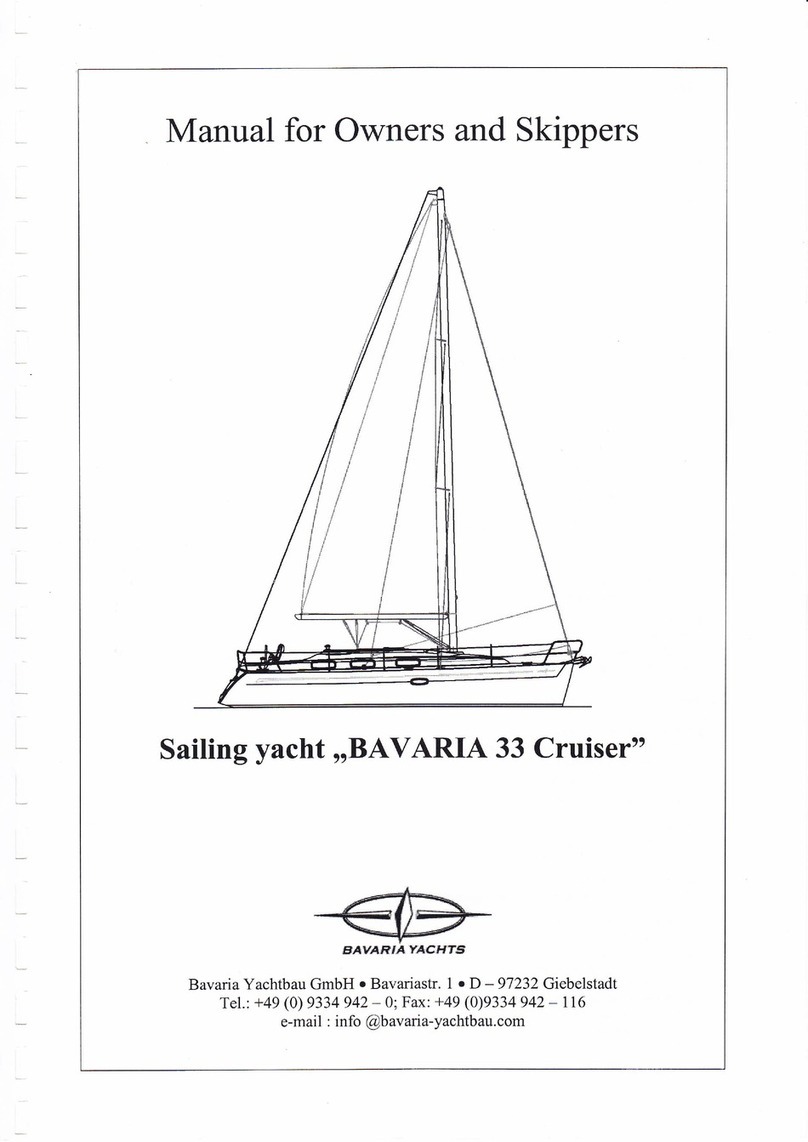
Bavaria Yachts
Bavaria Yachts 33 Cruiser User manual

Bavaria Yachts
Bavaria Yachts BAVARIA 32 User manual

Bavaria Yachts
Bavaria Yachts BAVARIA 44 - 3 cabins User manual
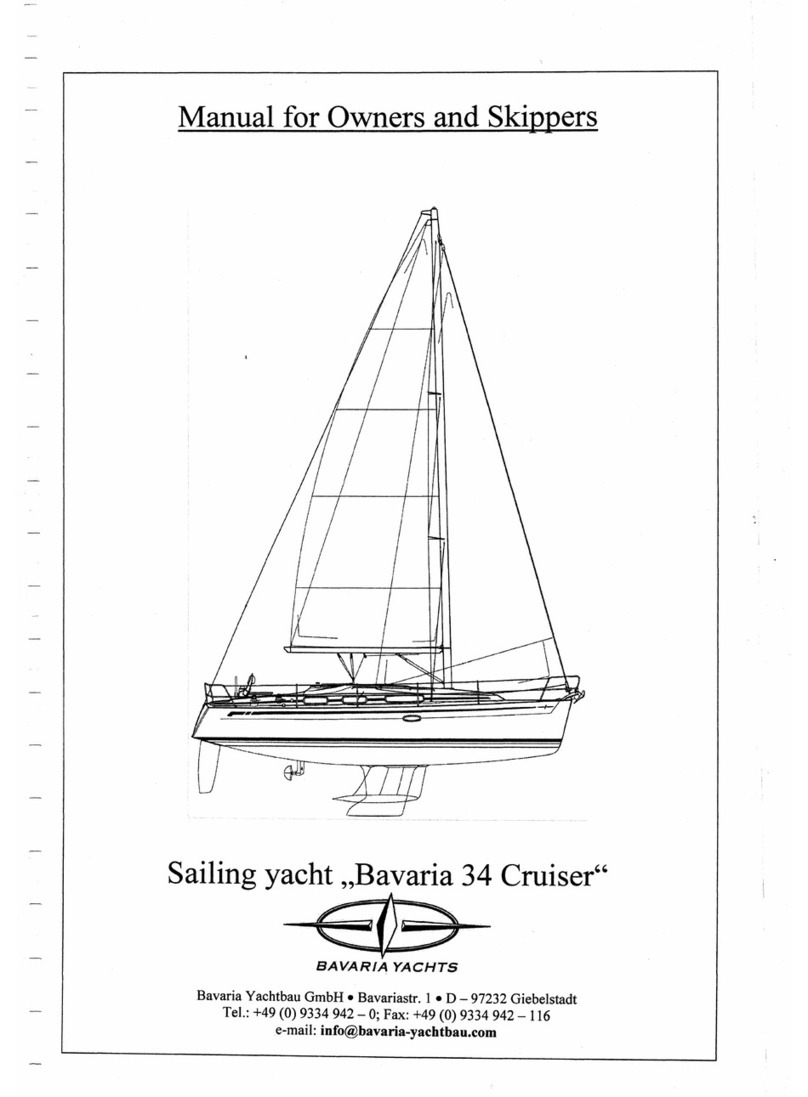
Bavaria Yachts
Bavaria Yachts 34 Cruiser User manual

Bavaria Yachts
Bavaria Yachts Bavaria 37 - 2 cabins User manual

Bavaria Yachts
Bavaria Yachts Vision 46 User manual
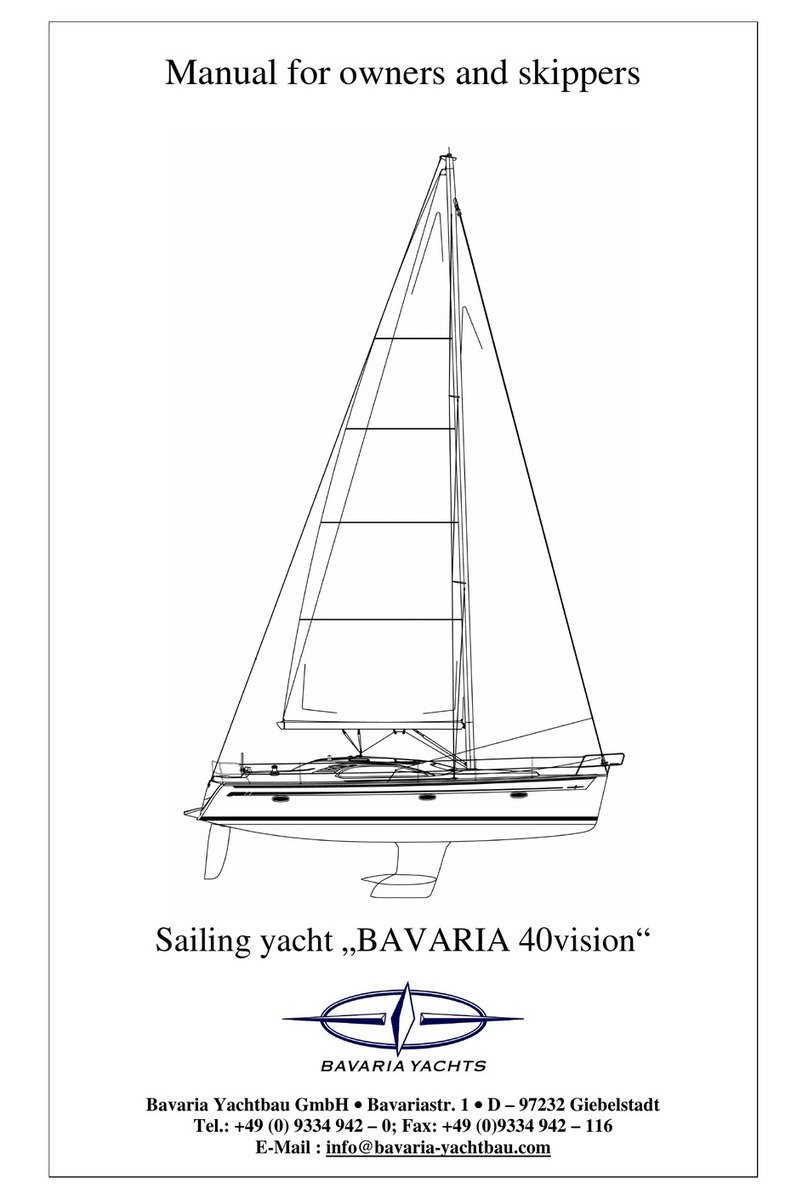
Bavaria Yachts
Bavaria Yachts 40vision User manual

Bavaria Yachts
Bavaria Yachts BAVARIA 38 User manual

Bavaria Yachts
Bavaria Yachts BAVARIA 50 Cruiser User manual

Bavaria Yachts
Bavaria Yachts Bavaria 49 User manual
